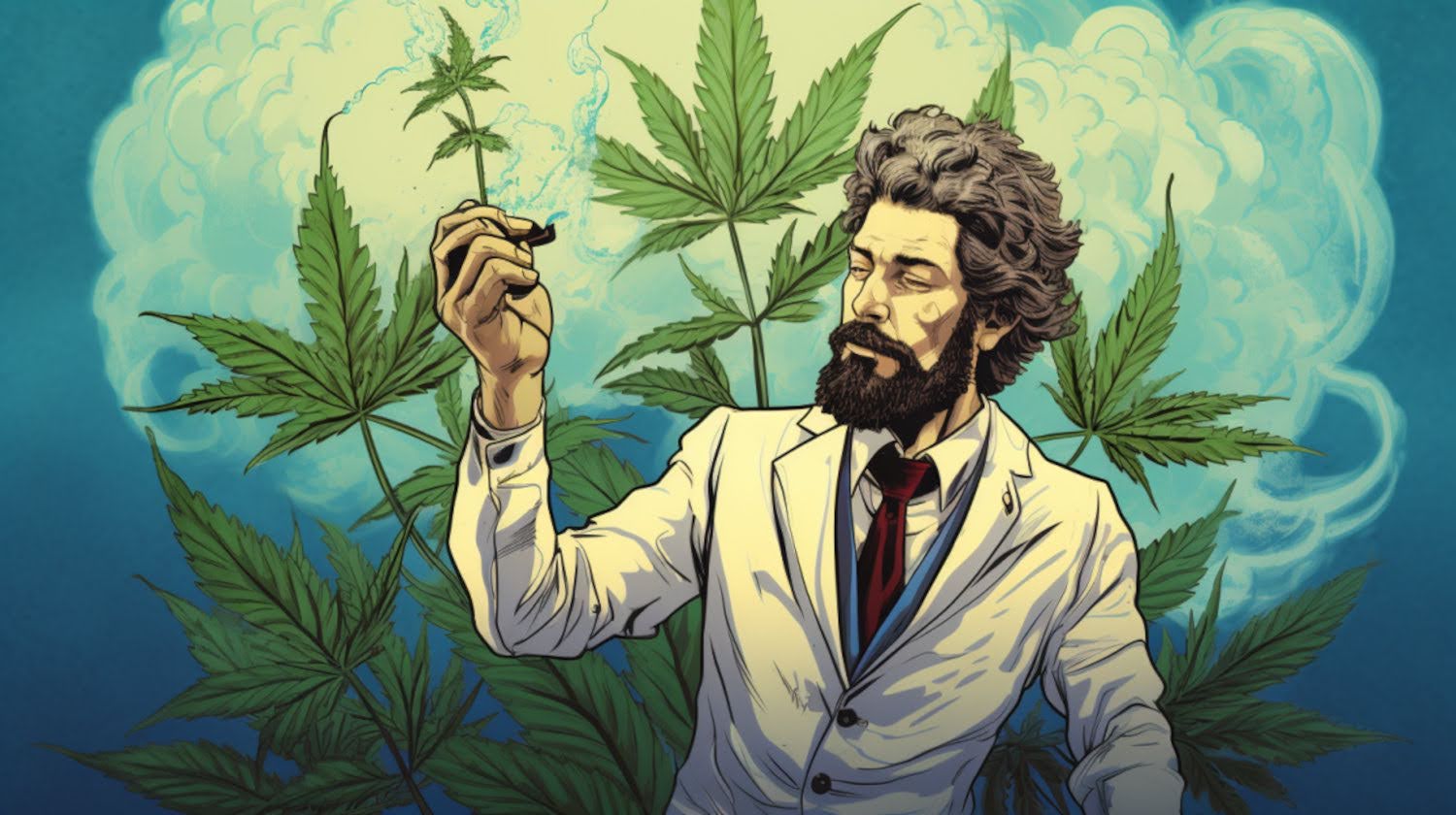In This Article
- Can doctors tell if you smoke weed?
- How can doctors tell if you smoke weed?
- Can doctors tell if you smoke weed by looking at your throat?
- What about other types of cannabis consumption? Are doctors also able to detect those?
- Should I tell my doctor I smoke or use weed?
- Are there instances where doctors are compelled to inform others about your cannabis use?
- Can doctors themselves use cannabis?
- Can other types of medical professionals tell if I smoke weed?
- About Dr. Kessler
Registrations for medical marijuana cards increased again in 2023, and the acceptance of plant-based cannabis medicine continues to blossom.
Despite this, stigma lingers, primarily based on outdated scientific research, lingering cultural beliefs, and a focus on adverse social effects.
Some people still feel a lingering stigma or discomfort when talking about the use of medical marijuana. Nowhere is this more evident than in the doctor’s office.
Although acceptance of plant-based medicine is growing among doctors, as of 2018, only 9% percent of US medical schools include medical marijuana information in their curriculum.
To the patient, a doctor is an authority figure. What if they are judgmental? Is talking about this going to cause me legal trouble? Will they refuse medications or even remove me from their practice?
And if you don’t tell them, can your doctor know if you smoke weed?
Can doctors tell if you smoke weed?
If you are in a room with ten people, there is a good chance that at least four have used cannabis in their lifetime. Can you identify who?
You might guess, but you would have no way to know for sure.
It’s the same for your doctor. When your doctor greets you at your office visit, they cannot instantly detect that you use cannabis. Even if you were required to go for pre-visit lab work, like blood or urine samples, your doctor is unlikely to know from the results.
Dr. Brian Kessler, Chief Medical Officer for NuggMD, explains, “Routine exams and blood tests aren’t conducted to detect THC. THC doesn’t show up in the blood or metabolic panels we might order for a routine physical. Even a drug screen would have to screen for THC metabolites specifically,” he noted.
As your doctor begins your in-office examination, can the doctor tell I smoke weed?
How can doctors tell if you smoke weed?

Let’s say you smoked cannabis right before you arrived at the doctor’s office. The doctor would rely on observation, including any of the classic signs of cannabis use: giggling, red eyes, trouble focusing. “If you come into the doctor's office still under the effects,” Dr. Kessler explains, “your doctor may have an idea. But they won't know how often you smoke or how much.”
Only a drug test that screens explicitly for THC will identify cannabis use. However, other signs to a physician may indicate cannabis use.
When your doctor prescribes a medication or treatment, they know what the result should be. If the treatment is negatively affected, cannabis may be the cause. Cannabis may change how some medications work or alter your perception of pain. “Maybe you are prescribed medication or given anesthesia for a surgical procedure,” Dr. Kessler said. “The effects of these could be dulled or exaggerated. Not only can this adversely impact a patient’s treatment and recovery, but it can also be dangerous.”
Your eyes may alert your doctor to cannabis use, but it isn’t because they are red. During routine examinations, your doctor may have you follow a light with your eyes or look from side to side or up and down. This exam, called the horizontal eye nystagmus test, detects an involuntary or jumping eye movement. Although many conditions can cause this, it may indicate recent cannabis or alcohol use. However, this test alone is not sufficient to positively determine use.
The final (and best way) for your doctor to learn you use cannabis is simply to tell them. Dr. Kessler said, “Your doctor is trying to provide the best possible treatment, and they can only do that if they have all the facts.”
Can doctors tell if you smoke weed by looking at your throat?
When it’s time to stick out your tongue and say "Ahhh," you might think that may alert the doctor you are using cannabis. Can doctors tell if you smoke weed simply by looking at your throat? “No,” says Dr. Kessler. "Not unless you just smoked and your breath smells like cannabis during the examination. If I'm examining a patient's throat, I can see if it's raw or tender, but there are many reasons besides cannabis that this could happen.”
Tar and other irritants are released when cannabis is burned or inhaled. This irritation can inflame the throat, causing soreness or discomfort. A red and irritated throat can indicate many conditions, from allergies to strep. Tobacco smoking can cause redness too, so “Even if a doctor suspects the throat irritation is due to smoking, they wouldn't know if it is cannabis.”
What about other types of cannabis consumption? Are doctors also able to detect those?
There are so many different ways to consume cannabis. Inhaled cannabis, like smoking or vaping, enters the bloodstream through the lungs and tinctures through the mucosa in your mouth. Edibles enter the body through the stomach and are metabolized by your liver, releasing into the bloodstream slowly.
Observable effects of any form of cannabis use may raise questions for doctors as they look for a cause. But again, you would likely have to be currently high for the doctor to notice you had used any form of cannabis.
No matter how you consume, your doctor must rely on science to determine if you have used cannabis. “The types of tests that could detect the presence of cannabis in a patient's system aren't the same as the routine exams and blood tests patients can expect in their doctor's office,” said Dr. Kessler. “And if a test for THC is positive, we still can’t know how much you consumed or how recently.”
A doctor may need to consider the possibility of cannabis use if your prescribed medication doesn’t perform as expected. “Cannabis can interact with some medications; a doctor will notice if a prescribed medication isn't working as intended. But that isn't proof of cannabis consumption."
Should I tell my doctor I smoke or use weed?
Some people hesitate to share information on cannabis use with their doctor, fearing a lecture or worse.
Doctors care about your health and well-being. Their role is to help keep you well, manage symptoms, and recover from disease. For your doctor to be most effective in accomplishing this, it is best to be open with your doctor and inform them of your cannabis use.
"You should absolutely tell your doctor if you use cannabis,” confirms Dr. Kessler. “Doctors recommend treatment based on each patient's physiology, lifestyle, needs, and other medications they're on.”
Your health and safety are the most important reasons to share this information with your doctor.
Prescribed medications can interact with cannabis. Dr. Kessler said, “The use of cannabis can affect other medications in potentially dangerous ways, including reducing desired effects and delaying a patient's recovery or increasing the severity of unwanted side effects, like drowsiness or drops in blood pressure.”
It is critical that patients talk to their doctor before any surgical procedure. Whether you consume by eating edibles, smoking, or other methods, cannabis’ sedative effect can interact with anesthesia. “Regular cannabis consumption may affect the amount of anesthesia needed,” Dr. Kessler said. “If your doctor or surgical team aren't aware of a patient's cannabis consumption, it could mean the patient receives too little or too much anesthesia, both of which can be extremely dangerous."
In almost every case, it is best to tell your doctor about your cannabis use.
Are there instances where doctors are compelled to inform others about your cannabis use?
Or is it always protected by doctor-patient confidentiality?

Doctor-patient confidentiality is a fundamental ethical principle in healthcare, and it generally protects the information you share with your doctor. However, there are some situations in which doctors may be compelled or legally required to disclose your cannabis use.
Dr. Kessler confirms this commitment, “Doctor-patient confidentiality is taken very seriously. Chances are a doctor would only disclose cannabis use if they perceived a serious risk of harm to you or another individual."
In other specific instances, such as under the Military Command Exception, military treatment facilities may disclose the cannabis use of Armed Forces personnel to Command authorities for reasons such as fitness for duty determinations or other activities crucial for the military mission.
Additionally, in some states, physicians might be obligated to report cannabis use if it affects a patient's ability to perform specific jobs or safely operate a vehicle. All Federal employees are required to be drug-free both on and off the job.
The restrictions on workplace testing for cannabis vary widely from state to state. If a doctor conducts a pre-employment or random drug test, an employer may sometimes create policies that prohibit cannabis use, even with a medical card. The doctor would be contractually required to report positive results.
It's important to note that the rules and regulations regarding doctor-patient confidentiality can vary by jurisdiction and may change over time. The specific circumstances under which a doctor might be compelled to disclose information about cannabis use can depend on local laws, ethical guidelines, and the nature of the situation.
Can doctors themselves use cannabis?
Doctors are permitted to use cannabis, with restrictions. “Most doctors can use cannabis medicinally or recreationally where it's legal, so long as they aren't impaired while practicing," said Dr. Kessler.
Physicians also must follow the regulations set out by their employers, which may prohibit use and require random drug testing. In the case of physicians employed by the federal government, cannabis use is not permitted.
And like all of us, physicians must follow all local, state, and federal criminal laws regarding cannabis use.
Can other types of medical professionals tell if I smoke weed?
It is best to inform all healthcare providers about cannabis use, but like physicians, definite proof only comes from testing. Dr. Kessler said, "Unless you are actively under the influence, it's unlikely to be detected. Cannabis use can have some telltale signs, but none are proof that you smoke cannabis."
Eye doctors (Ophthalmologists or Optometrists) may notice specific physical signs of cannabis use during an eye examination. These can include red or bloodshot eyes, which are common side effects of cannabis due to its ability to dilate blood vessels in the eyes.
Psychiatrists are interested in understanding your mental health, including any potential impact of cannabis use on your mental well-being. Any mental health treatment, especially if it includes prescription medication, should take into account your cannabis consumption.
Nurses are often your first contact in medical evaluations and may note physical symptoms or behavioral changes associated with cannabis use. Nurses may ask if you use cannabis, especially concerning your current symptoms or upcoming treatments.
Especially if you smoke cannabis, dentists will look for oral health issues, such as dry mouth or an increased risk of gum disease. All smoking may impact oral health. Since many dental procedures include anesthesia or post-op pain medication, your dentist should be informed of your use.
Patient confidentiality laws bind all these healthcare providers, who will treat your disclosures with the required discretion. While they may observe tell-tale signs or question you about your cannabis use, your openness will help them make informed decisions about your treatment and address any potential health concerns.
About Dr. Kessler
NuggMD Chief Medical Officer Brian Kessler, MD, is a sports medicine and pain management specialist based in New York City. His medical career spans nearly 25 years in rehabilitative medicine.
After serving as an in-house trauma surgeon for multiple New York City hospitals and trauma centers, he became the owner and Medical Director of Spine and Sports Medicine in midtown Manhattan in 2000. An Emory University and St. George’s University School of Medicine graduate, he holds medical licenses in New York and California.
He continues to be an advocate of medical cannabis as adjunctive therapy for his private practice and his NuggMD patients alike.
The information in this article and any included images or charts are for educational purposes only. This information is neither a substitute for, nor does it replace, professional legal advice or medical advice, diagnosis, or treatment. If you have any concerns or questions about laws, regulations, or your health, you should always consult with an attorney, physician or other licensed professional.




